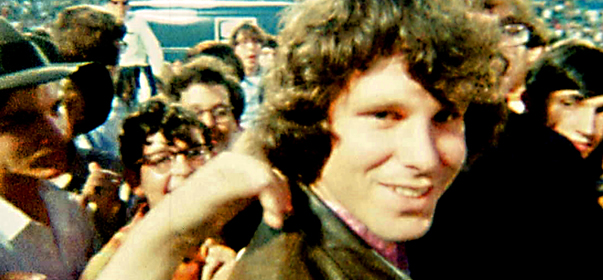|
Reviews of Recent Independent, Foreign, & Documentary Films in Theaters and DVD/Home Video

WHEN
YOU’RE STRANGE: A FILM ABOUT THE DOORS There are no reconstructions, recreations, or imitations in When You’re Strange: A Film About The Doors, and none of the fake wigs that helped make Oliver Stone’s The Doors so awkward. The shaggy-haired young man wandering through the desert and searching for Joshua Tree throughout the documentary is the real Jim Morrison in 1969 outtakes from Paul Ferrara’s unfinished HWY. Those extensive scenes have never been seen publicly before, and neither have most of the footage taken out of fans’ and family members’ storage. These striking visuals are essential viewing for any rock ‘n’ roll historian, let alone any fan of the Doors. While this is writer/director/composer Tom DiCillo’s first documentary, his feature films, from his debut Johnny Suede to his most recent Delirious, have focused on characters fascinated with image and fame. With Jim Morrison and the Doors, he locates the sweet spot where sex, drugs, and rock ‘n’ roll changed the look and sound of the celebrity maw. (A change appreciated by Andy Warhol, who is glimpsed admiring Morrison at the Factory.) The amazing treasure trove includes the band’s first rehearsals, their early gigs at the Whisky A Go Go in 1966 (with its signature dancers), and Morrison’s down-and-dirty stage antics. The behind-the-scenes footage, particularly during recording sessions, makes clear what a strain Morrison’s increasingly out-of-control alcoholism was on his bandmates, who are seen as consummate musicians setting down beats and licks that rocked hard. While literary, jazz and R & B influences on the individual musicians are cited, that the Doors were very much a rock band cutting through the pop landscape comes across, even before the narration intones them as America’s answer to the bad boys of the British Invasion, the Rolling Stones. Based on band members’ memoirs and sanctioned by family and participants, contributions other than Morrison are carefully given credit, particularly Robby Krieger’s songwriting. Producer Paul Rothchild is cited for securing their commercial success in 1967 by cutting “Light My Fire” down to a three-minute version acceptable to the rigid AM radio format. Even though DiCillo is a boomer, his script leaves out that it was the playing of the full seven-minute LP version that helped ignite nascent FM freeform radio, where fans turned to hear the genuine article (let alone an album side). Morrison’s flouting of Ed Sullivan’s restrictions on singing the word “higher” when performing the song on TV is given more emphasis than how steadily the camera stayed above the waist of his tight leather pants. The Doors’ engineer Bruce Botnick also oversaw this soundtrack, but very few of the songs are live tracks. Most are recorded versions synchronized to the extraordinary footage. (I waited in vain among the dozen or so songs to hear my favorite Morrison rebel yell “You cannot petition the Lord with prayer!” intro to “Soft Parade.”)
One can quibble over some factual
errors and the confusing chronology that skips around each year of the
Doors’ short reign until Morrison’s Paris death in 1971, but the
extended clarifications around the disrupted concerts at the Singer Bowl
(more accurately in Queens than “on Long Island”) and in Miami, with its
legal ramifications, are revealing. But do not see the film for Johnny Depp’s narration (which
replaced the director’s
voice in the version screened at festivals). In addition to his solemn
rendition of several Morrison poems, his breathy portentousness only
accents every possible cliché about “the Youth Movement” (as DiCillo has
him repeatedly call the period) over all the usual images of protest and
war that have been seen ad nauseam. Just rock on to the still-fresh
images of the Lizard King and his court.
Nora Lee Mandel
|

